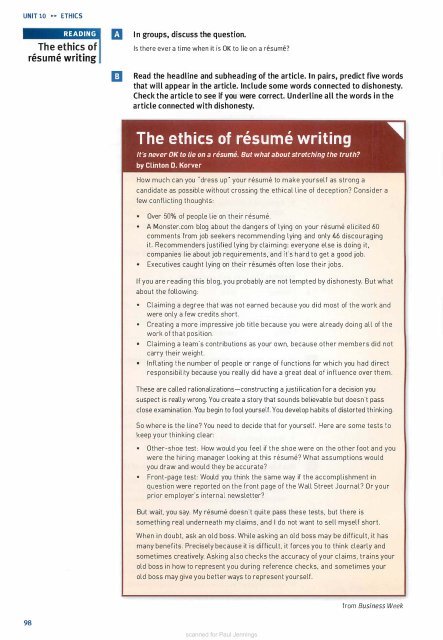Market Leader Intermediate 3rd edition SB
You also want an ePaper? Increase the reach of your titles
YUMPU automatically turns print PDFs into web optimized ePapers that Google loves.
UNIT 10 •• ETHICS<br />
READING<br />
The ethics of<br />
reSUme writing<br />
iii In groups, discuss the question.<br />
Is there ever a time when it is OK to lie on a resume?<br />
I] Read the headline and subheading of the article. In pairs, predict five words<br />
that will appear in the article. Include some words connected to dishonesty.<br />
Check the article to see if you were correct. Underline all the words in the<br />
article connected with dishonesty.<br />
The ethics of resume writing<br />
It's never OK to lie on a resume. But what about stretching the truth?<br />
by Clinton D. Korver<br />
How much can you "dress up" your resume to make yourself as strong a<br />
candidate as possible without crossing the ethical line of deception? Consider a<br />
few conflicting thoughts,<br />
•<br />
Over 50% of people lie on their resume.<br />
•<br />
A Monster.com blog about the dangers of lying on your resume elicited 60<br />
comments from job seekers recommending lying and only 46 discouraging<br />
it. Recommenders justified lying by claiming, everyone else is doing it.<br />
companies lie about job requirements. and it's hard to get a good job.<br />
•<br />
Executives caught lying on their resumes often lose their jobs.<br />
If you are reading this blog. you probably are not tempted by dishonesty. But what<br />
about the following'<br />
•<br />
Claiming a degree that was not earned because you did most of the work and<br />
were only a few credits short.<br />
•<br />
Creating a more impressive job title because you were already doing all of the<br />
work of that position.<br />
• Claiming a team's contributions as your own, because other members did not<br />
carry their weight.<br />
• Inflating the number of people or range of functions for which you had direct<br />
responsibility because you really did have a great deal of influence over them.<br />
These are called rationalizations-constructing a justification for a decision you<br />
suspect is really wrong. You create a story that sounds believable but doesn't pass<br />
close examination. You begin to fool yourself. You develop habits of distorted thinking.<br />
So where is the line? You need to decide that for yourself. Here are some tests to<br />
keep your thinking clear,<br />
•<br />
Other-shoe tesL How would you feel if the shoe were on the other foot and you<br />
were the hiring manager looking at this resume? What assumptions would<br />
you draw and would they be accurate?<br />
•<br />
Front-page test, Would you think the same way if the accomplishment in<br />
question were reported on the front page of the Wall Street Journal? Or your<br />
prior employer's internal newsletter?<br />
But wait, you say. My resume doesn't quite pass these tests, but there is<br />
something real underneath my claims. and I do not want to sell myself short.<br />
When in doubt. ask an old boss. While asking an old boss may be difficult. it has<br />
many benefits. Precisely because it is difficult. it forces you to think clearly and<br />
sometimes creatively. Asking also checks the accuracy of your claims, trains your<br />
old boss in how to represent you during reference checks. and sometimes your<br />
old boss may give you better ways to represent yourself.<br />
from Business Week<br />
98<br />
scanned for Paul Jennings


